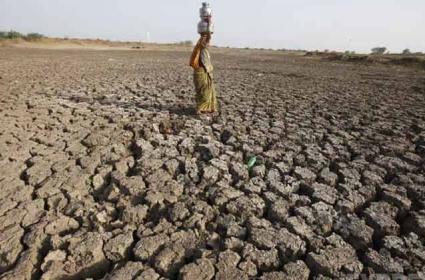In Rajasthan’s Drought Hit Baran, Children Turn Green Agents

Jaipur: The "green agents" of Baran district in Rajasthan are nurturing foliage in their villages, despite a two-year rainfall deficit in the region. Over 3,000 children across 20 villages have planted 7,000 saplings thus far.
For two consecutive years, most of the villages in the district have not received substantial rainfall, leading to severe drought-like conditions. In fact, according to the Rajasthan's Water Resources Department and the India Meteorological Department, Baran has witnessed one of the least rainfalls amongst other regions in the past three years.
In the face of this harsh reality, children belonging to the local communities stepped up to save their villages. Taking stock of the dire situation, World Vision India (WVI), a child-focused humanitarian organisation, reached out to the youth in these rain-starved villages four years ago. Through a climate change sensitisation programme, WVI aimed to make children the agents of change in their communities and facilitate a community-led natural environmental regeneration.
Under this programme, the children planted two saplings each of local varieties of trees, as well as adopted a tree near their house. Furthermore, an "Activity Book on Environment" was provided to them to keep them engaged in a series of activities that spelled out the importance and value of trees. In the blistering heat of Baran, these trees now bring much relief to locals.
Radha, an 18-year-old "green agent" from Prem Nagar village, along with her 16-year-old brother Ram, has managed to set up a massive fruit and vegetable garden with lady finger, eggplant, guava, mango, banana and many more.
"Earlier, there was hardly any water or plants to grow and harvest crops. Our parents were struggling to earn money. At that time, there wasn't any plant here in our front yard. Now, an entire garden has come up over these past three years. Now, we hardly buy fruits or vegetables from the market." Ram added.
Another "green agent", Prakash, who witnessed the dwindling water resources in his village, was only a 14-year-old when introduced to the programme. Today, as a 19-year-old, besides caring for the saplings which have now grown into lush green trees, he is a proud owner of his self-cultivated garden, where he grows pomegranates, lemons and eucalyptus.
When Sulochana got married and came to Karwari Khurd village in Baran, she was shocked to find hardly any greenery in her surroundings. Commenting on WVI's intervention, she said: "My children are part of the Children's Club in our community. Three years ago, I was overjoyed to see them return with saplings in their hands as I come from a village where my father grew many fruits and vegetables near our house. Here, in Karwari Khurd, there are barely any plants and trees due to lack of water. Even tube wells don't help because the ground water level is very low."
"I immediately helped my children plant these saplings in our front yard. My three older children and I watered and nurtured them to see them grow into beautiful trees that are bearing us fruits and giving us shade," she added.
In the blistering heat of Baran, these trees planted by the "green agents" have managed to bring much relief to the local inhabitants both in terms of weather and livelihood. WVI conducted a focus group discussion in four of the 20 villages where the programme was implemented to understand its implications. The following observations were made:
* 63.78 per cent of the saplings are bearing fruits and average of 23 kilograms is being procured by each family.
* While these fruits are either self-consumed or sold at the local market, about 58 per cent of them are even sharing it with their friends and relatives
* 81.51 per cent saplings given to the children are alive and thriving
* Around 71 % said that the saplings have provided shade outside of their homes
Baran, however, was not always a dryland. The district was filled with greenery many years ago, as Hajarilal, a former village head from this village recalls.
"This region was considered as the ‘Kashmir of Rajasthan' with streams of water meandering through the green land. The field landscape was lined with sugarcane and water shortage was an alien concept. Wildlife such as deer, nilgai, wild boar, monkey, sarus crane, vultures and peacocks, thrived in the forests," he said.
The forests are now unfortunately lost to the forest mafia, who hacked the trees to make profits out of selling teakwood. This resulted in deforestation and degradation of the land, significantly reducing the infiltration of rain water and the water holding capacity in the area.
When some districts of Rajasthan received above normal rainfall in 2016, Baran sweltered away with a deficit rainfall of -28.5 per cent. The following year, the situation worsened to -31.08 percent. Latest data from March 2018 to May 2018 indicates that Baran has not received any rainfall (-100%) despite there being a storm in the region.
In such an adverse scenario, these young "green agents" are tenaciously fighting to build a clean and green future for themselves.
(Mridula Narayan is the Communications Associate at WVI. The views expressed are those of WVI. She can be contacted atmridula_narayan@wvi.org) (IANS)



















